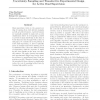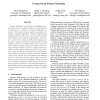603 search results - page 76 / 121 » A theory of learning from different domains |
112
click to vote
JCAL
2010
14 years 8 months ago
2010
Abstract The modality learning effect proposes that learning is enhanced when information is presented in both the visual and the auditory domains (e.g. pictures and spoken informa...
102
click to vote
COLING
1996
15 years 2 months ago
1996
Two problematic issues in most lexicon systems today are their size and restricted domain of use. In this paper, we introduce a new approach to lexical organization that leads to ...
117
click to vote
ICML
2009
IEEE
16 years 2 months ago
2009
IEEE
Dual supervision refers to the general setting of learning from both labeled examples as well as labeled features. Labeled features are naturally available in tasks such as text c...
221
click to vote
ICDE
2005
IEEE
16 years 2 months ago
2005
IEEE
Schema Matching is the problem of identifying corresponding elements in different schemas. Discovering these correspondences or matches is inherently difficult to automate. Past s...
140
click to vote
JUCS
2010
15 years 6 hour ago
2010
: Classical classification and clustering based on equivalence relations are very important tools in decision-making. An equivalence relation is usually determined by properties of...


